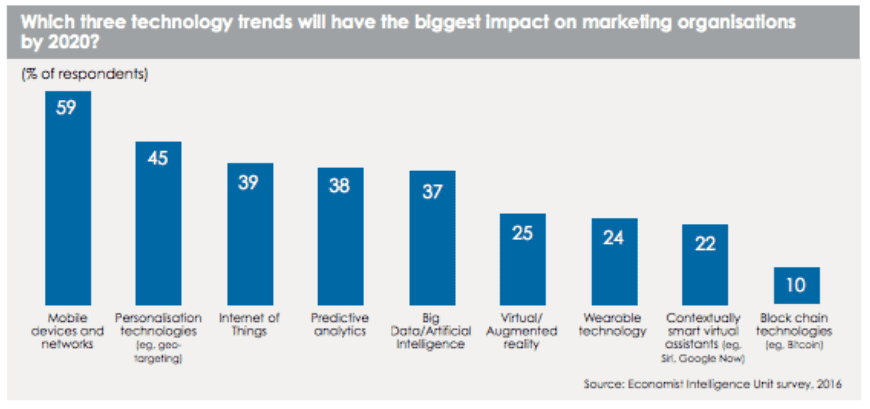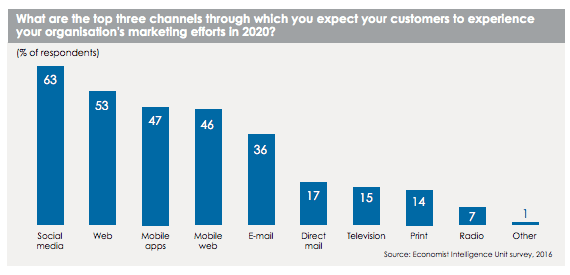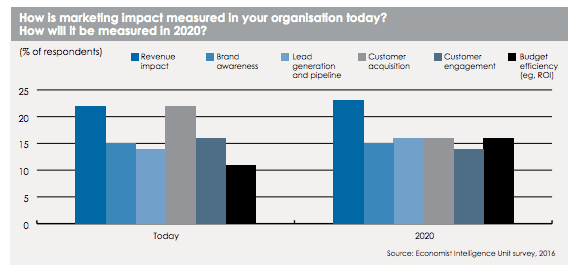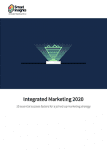Marketers are expected to take full control of the customer experience in the coming years
The Economist Intelligence Unit asked 499 (one can't help but think they were aiming for 500) Chief Marketing Officers and Senior Marketing Execs about how they saw marketing evolving, and also conducted some in-depth, one on one interviews with CMOs from leading brands such as Unilever and JPMorgan Chase. They were looking to find out what key technologies and trends will drive change in the marketing industry over the next four years, and the results make for interesting reading.
Here we've summarised some of the key findings for marketers, but if you want the full report you can sign up to download it.
Hottest tech trends for marketers
The chart below is in many ways not all that surprising. Mobile has been a massive trend in marketing for years now, and makes up over half of web traffic. The internet of things is a bit newer and more exciting, but it isn't yet quite clear exactly how it will affect marketers. There are plenty of opportunities and predictions, but anyone who tells you they know exactly how the IoT will be affecting your marketing in 2020 is either lying or profoundly misguided.
Personalisation technologies have been around for a while, but with the amount of data now available at their companies fingertips, CMOs are starting to realise the opportunity and personalisation is really coming into its own. Geo-targeting is just the start, and shouldn't be your objective. Advanced marketers should be building statistical models to ascertain what signals mean customers are interested in certain products and serving them accordingly.
A generally new and groundbreaking technology for marketing that appears here is block-chain technologies, but again it isn't clear how this will evolve by 2020. The implications for banking, law and intellectual property are starting to be realised, but how it will prove useful for marketers isn't yet clear.

Artificial Intelligence has been a hot topic of late, particularly since Google's Alpha Go AI beat the world Go champion. Combining AI with content personalisation offers some incredible opportunities for marketers, and this is something those with the capabilities to experiment with it should definitely be looking at.
The key channels in 2020
I don't know about you, but when someone says 2020, I can't help but think that it's a way off. Weren't we all going to have robo-butlers, flying cars and mind reading computers by 2020? Or at least a moon base?
But, of course, it's not really that far away. Remember 2012? Doesn't seem that long ago does it? What's that? It feels like the London Olympics were only yesterday you say? Damn right it does. Point is that more time has passed since then, than the time needed to reach 2020. I realise I'm labouring this point like a Stakhanovite, but I think it's too easy to think the future is always a few years off, and not realise that before you know it we'll be living in it. Without noticing your marketing efforts fell behind. Just like that.
So with that in mind, think about this chart of what CMOs think will be the key marketing channels for their businesses in 2020. Social leads the pack, and mobile apps and mobile web are 3rd and 4th. Does this reflect your current investment priorities? Investing in the channels of the future today and not at a later date is the only way to ensure you don't fall behind.

Measuring the effectiveness of your marketing efforts
Marketers are often seen as struggling to review the effectiveness of their campaigns. In fairness, this isn't all there fault. It's very hard to prove an uptick in sales is the result of a new ad campaign, a change of the messaging on the website or a whether it was just because of a big push by the sales team.
But digital technologies provide massive opportunities for more accurately measuring key metrics and seeing how marketing is affecting sales. Calculating the all important ROI is only possible when you have accurate data on what is driving traffic and conversions.

Marketers are looking to rely less on customer acquisition stats and more on ROI, which after all is the ultimate objective of any marketing campaign. This makes sense, and is an admirable objective. However, if you think you'll be able to measure for ROI in four years time, you should be asking yourself, why can't we measure for ROI now? No technological breakthrough will come along in the next four years which will let you wave a magic wand and have your ROI calculated for you.
The technology to be able to model ROI by measuring all kinds of data already exist, and if you think you'll be doing so by 2020 you should start planning the implementation now.
For more insights into marketing 2020 you can sign up to download the full report from the Economist Intelligence Unit, in partnership with Marketo.
Access Free Member resource – Integrated Marketing 2020 Guide
Our briefing will step you through 10 success factors which leading companies are deploying today to future-proof their business by creating more effective, joined-up media investments and customer journeys.PTION.
Access the Integrated marketing megatrends










